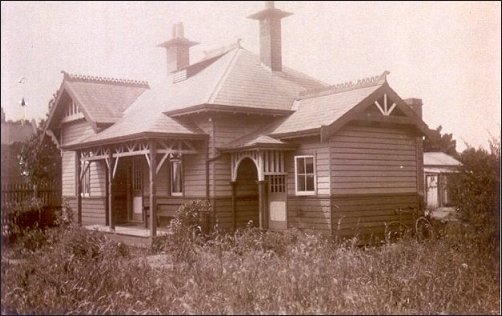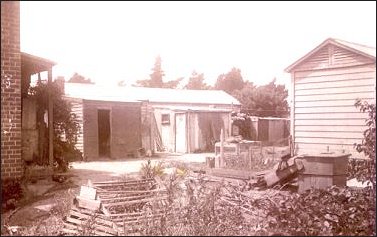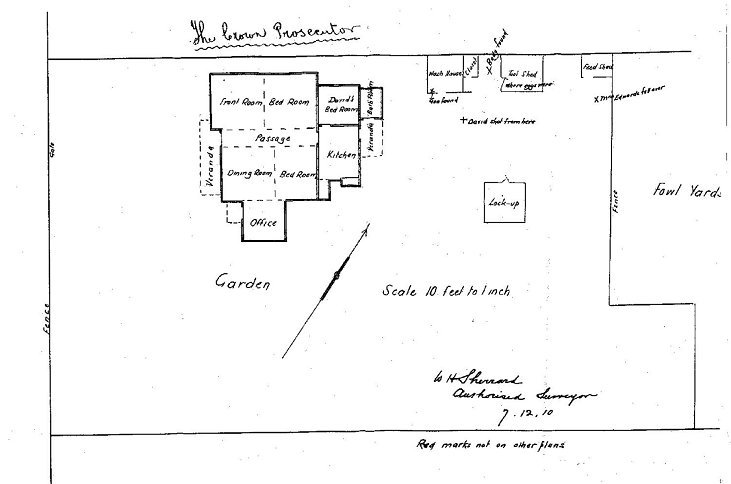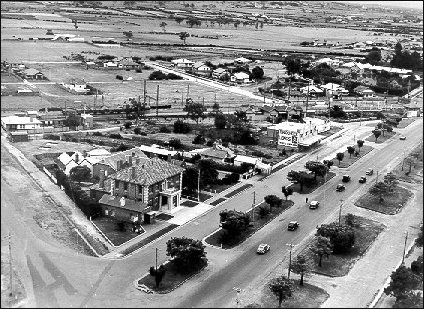Tragedy at Moorabbin

Moorabbin Police Station, 1910. Reproduced with permission of the Keeper of Public Records.
Constable Edwards, the 48-year-old officer in charge of the Moorabbin Police Station, was shot by his son, and died at Nurse Watt’s private hospital in Cheltenham on November 20, 1910. David Edwards was arrested and charged with intent to murder his father; a wilful, malicious, and felonious act. Mr Justice Hodges in directing the jury of twelve men in the Criminal Court, pointed out that there could only be one of two possible conclusions to the trial; a verdict of murder or of manslaughter.
A stout and strongly built man, Constable Edwards, had joined the police force in 1884 but had only been at Moorabbin for five years. He had forfeited promotion to take the position because he didn’t want additional responsibilities and sought a job ‘where he could live quietly’. The Moorabbin station was regarded as ‘almost a sinecure’ providing ‘abundant leisure time’ for a person to pursue other interests. [1] Established in July 1901 it was located on the east side of Point Nepean Road, north of the railway station, between the residence of Mr William Bay, a market gardener and the Shire Hall. Until 1909 it was known as the Brighton South police station. [2]
Six members of the Edwards family lived in the police quarters. Two sons, both employed as bankers, and a daughter were residing independently, while four children were still living at home; David 21, Alfred 17, and two daughters Alice 11 and Maudie 9. [3] Another member of the household, in addition to the constable’s wife, was Mary Coffey, an eighteen year old domestic servant.
Much of the land surrounding the police house and office was taken up with a poultry run and a kitchen garden that was an object of admiration by many local market gardeners. The fowls and their eggs provided a significant supplement to Edwards’s police income and were jealously guarded by him from interference or involvement by members of his family. It was pointed out in one report that the hobby of fowl breeding had got such a hold on him that he kept the eggs securely locked up in a shed. [4]

Backyard of the Moorabbin Police Station, 1910. Reproduced with permission of Keeper of Public Records.
The night before Constable Edwards’ death, his wife asked him for some eggs for the breakfast of their sons the following morning. He said, “No!” As a consequence David, a plasterer, left for work at Oakleigh after eating bread and butter. At twelve o’clock on Saturday November 20, Mrs Edwards again asked for an egg but this time it was for herself, indicating she was in ‘a weak state of health’ [5] Constable Edwards again refused access to his egg supply, suggesting she should eat some meat. “No, I’ll give you none. There is plenty of meat inside; use that,” he is reported to have said. [6] Obviously annoyed with her husband’s response she indicated her determination to have an egg for dinner and said she would break into the shed where they were stored. Edwards reply was “If you do I’ll knock your _____ head off.” Not deterred Mrs Edwards picked up an axe and walked towards the shed.
After Mrs Edwards had taken several steps her husband caught up to her, struck her with his clenched fist and caused her to fall to the ground where she struck her head on a chicken coop. With a bleeding head she screamed and so did the servant, Mary Coffey, and the two Edwards girls who witnessed the incident. Edwards shouted at the girls ordering them to ‘Shut up!” as he said the neighbours might be alarmed. Although the neighbours did hear the commotion they paid no attention as such events were common in the Edwards household and they did not wish to interfere. Mrs Edwards still crying, stood up, and returned to the house to prepare the dinner.
David Edwards, arriving home from work at one o’clock, noticed his mother had been crying. He asked the reason and was told of the preceding events by his sisters. Immediately he went to his room, collecting a double-barrelled breech loading gun, and walked out into the yard challenging his father to explain why his mother had been knocked to the ground. Constable Edwards denied it, and suggested Mrs Edwards was “making a nonsensical fuss out of nothing.” [7] David said, “You are always hitting her in her delicate state and knocking her down,” and fired the gun at his father who was standing five yards away.

Plan of the Police Station and the site of the tragedy Reproduced with permission of the Keeper of Public Records.
Constable Edwards was hit on the right side. The wound was four inches by two and a half inches and large enough for the insertion of a man’s fist. Three or four ribs had been blown to splinters, the lungs had been perforated and part of the liver exposed. A wad was found embedded in the liver together with a number of pellets of shot. [8]
On hearing the report of the gun, Stanley Reynolds, a grocer with a shop on the opposite side of Point Nepean Road, rushed with Percival White, a Moorabbin coachbuilder, to the police station where they met David Edwards at the front gate. David was still carrying the gun and in an excited state, told them, “I have shot the old man. You will find him in the back yard.” [9]
David returned with the neighbours to the back yard where his mother was wiping her husband’s brow with a damp cloth. Perhaps realizing the serious nature of the injuries, David suggested a doctor should be called. Stan Reynolds had already done this, and Dr Joyce and Dr Weigall arrived within fifteen minutes of the original shooting.
Constable Hore of the Cheltenham police station was called and arrived on his bicycle shortly after the doctors to find young Edwards eating his dinner in the kitchen. Earlier David had surrendered his gun to a neighbour. Making no excuse to the constable he admitted shooting his father saying, “I’ll make no bones about it. I shot him all right.” [10] Hore then arrested him and locked him up in the prisoner’s cell in the backyard of the station.
The wounded constable was carried to the office of the police station where he made a statement to Sergeant Purcell who had arrived from Brighton. In shock, but bearing the pain well, Edwards conversed freely with the sergeant stating that his son had come of out the house and said, “something about me interfering with mother. He then took the gun and deliberately shot me.” [11] Before being placed in the shire ambulance for transfer to Nurse Watt’s hospital in Cheltenham, Mrs Edwards bent over him to kiss him. Edwards put his hands over his face and repelled her, saying, “I don’t want anything to do with you or any of them.” [12]
After being operated on by both Dr Joyce and Dr Weigall at about 8 o’clock that night, and despite the advice of Dr Joyce, Edwards told Constable Hore that he was not going to die, and invited Hore to join him the next morning. Later that night he seemed to rally but soon after began to sink. Towards the last, when he realised that he would not live, he said, “I hope David will swing for it.” [13] He died on Sunday morning through shock and haemorrhage, and was buried on the Wednesday in the Presbyterian section of the Melbourne Cemetery
David Edwards was brought before E T Penny, J.P., at the Cheltenham Court on the day of the funeral, formally charged with wilful murder, and remanded to appear at the Criminal Court. His legal representative applied for bail but it was refused so David was conveyed back to the Melbourne gaol to await the trial. [14]
At the Criminal Court, before Mr Justice Hodges, the Crown Prosecutor presented the details of the affair calling upon Stanley Reynolds, Constable Hore, Sergeant Purcell, Mary Coffey, Dr Mollison, the government pathologist, and Dr Joyce in making his case of murder. Mr Maxwell, the barrister, acting for David Edwards, argued that the crime was one of manslaughter, not murder, pointing to the character of Constable Edwards and his treatment of his wife. David Edwards, he said, was acting under great provocation, reacting to a situation which was a sadder, more cruel and more brutal treatment of a wife and family than any he had come across in his professional life as a lawyer. [15]
Mrs Edwards was not a well woman and the relationship between herself and her husband was strained. The Age reported, “Her husband had a reputation of being unkind and inconsiderate to her, regarding her ailments with impatience and her various disabilities with contempt.” [16] Olivia Davis who had stayed with the Edwards family the previous year, at a time when Mrs Edwards was ill in bed, recounted that after Mrs Edwards was taken to hospital Constable Edwards said, “Thank God she’s gone and may she never come back.” Constable Duggan who had known the Edwards family for 12 years told the court of the occasion when Edwards said to his wife, “It’s a pity you wouldn’t die, you old ____. You are only in the road of another good woman.” Elsie Edwards, the eldest girl, told the court that her mother had been a sufferer for 17 years. The last witness to be called was Constable Edwards’s mother. Elizabeth Edwards, deeply emotional and infirm, was given a chair on the floor of the court where she faced the questioning of Mr Maxwell. Sobbing she said her son was “The best boy that ever was! When he was only a little boy he stood between me and his father, and said, ‘You coward, to hit my mum like that!’ ” Mr Maxwell did not continue his cross examination of the witness. [17]
Justice Hodges in summing up the trial said a deliberate act to take the life of a fellow man, providing that the act is unlawful, constitutes murder but the act which ordinarily requires a verdict of murder may be regarded as justifying a verdict of manslaughter, if the jury is satisfied that the act which caused death was brought about by provocation. If in the heat of passion, and in circumstances sufficiently provocative, a man is deprived of his self control there may be a case to reduce the verdict to manslaughter. The judge indicated that David Edwards did intend to take his father’s life, the husband and wife had lived unhappily together for many years, Constable Edwards was indifferent to his wife’s suffering, he physically abused her, and his language was vile.
The jury retired to consider its verdict and returned in eleven minutes with the verdict of manslaughter, adding a strong plea for mercy. [18] The next day the court resumed its sitting for the pronouncement of sentence when the judge indicated he had great difficulty in determining the punishment. He pointed to the nature of the crime, “You have not only taken the life of a human being but the worst form is that you have taken the life of the man who was the author of your existence.” He went on to examine the extenuating circumstances; unkindness towards an ill mother who was unable to take her own part against a strong man. Nevertheless, he believed the jury had already taken these facts into account when reducing the verdict from murder to manslaughter. “Sentiment must not interfere with justice. No man who feels he has been wronged can take the law into his own hands and shoot or stab a man whom he believes has wronged him,” he ruled. Therefore Justice Hodges considered himself obliged to administer nothing less than two years’ hard labour. [19]

Aerial view of Moorabbin showing former Police Station behind shop in Point Nepean Road, next to Shire Office, C1930.
Footnotes
- Age November 21, 1910.
- Sands & McDougall – Victorian Directory 1911.
- Brighton Southern Cross, November 1910. In the statement made to the police Mrs Edwards said, “David is a plumber employed by the New Benevolent Asylum at Cheltenham. Alfred is employed at a bank in Melbourne. Alice and Maudie go to school. My oldest son 23 years and daughter 24 years are away from home in employment.” No mention was made of the third son. VPRS 30/P/0000 Unit 1566 File 585/1910.
- Brighton Southern Cross November 1910.
- Argus November 21, 1910.
- Age November 21, 1910.
- Brighton Southern Cross November 21, 1910.
- Age November 21, 1910. Dr C H Mollison the government pathologist conducted the post-mortem of the body and reported to the Supreme Court, “The body was that of a tall stoutly built man 6 ft. high and about 50 years of age. The body was swollen and discoloured by decomposition. There was a gaping would 4 inches from side to side and 2 ½ inches from above downwards on the right side of the chest 2 inches below and inside the nipple, the costal cartilages had been broken into fragments and the liver -----in the wound around the wound especially below and to the inner side there were about 30 separate shot wounds, the edges of the main wound were rugged and inverted. On opening the abdomen a tremendous lacerated would was found in the liver exposing the main vessels, numerous shot were found in the liver substance and a number more with a wad had passed through the liver and were found behind it in the abdominal cavity; blood was found in the peritoneal cavity and in the pelvis. The heart was honey combed with gas bubbles; it was large and contained some clotted blood. The lungs were engorged posteriorly. The kidneys were enlarged and contained a quantity of minute gas bubbles. The stomach was distended with gas and contained a little thick fluid. The spleen was fairly large. The diaphragm was lacerated in front and contained a few shot. The brain did not show anything abnormal. The windpipe was discoloured and contained some dirty mucus. Death was due to a gunshot wound of the liver. I did no see any powder marks on the skin. I produce some shot that I found in the body. The gun could not have been held very far away.” VPRS 30/P/0000 Unit 1566 File 585/1910.
- Argus November 21, 1910.
- Argus December 15, 1910.
- Age November 21, 1910.
- Age November 21, 1910.
- Brighton Southern Cross, November 21, 1910.
- Brighton Southern Cross, November 21, 1910.
- Age December 14, 1910.
- Age November 21, 1910.
- Argus December 15, 1910.
- Argus December 15, 1910.
- Argus December 16, 1910.
